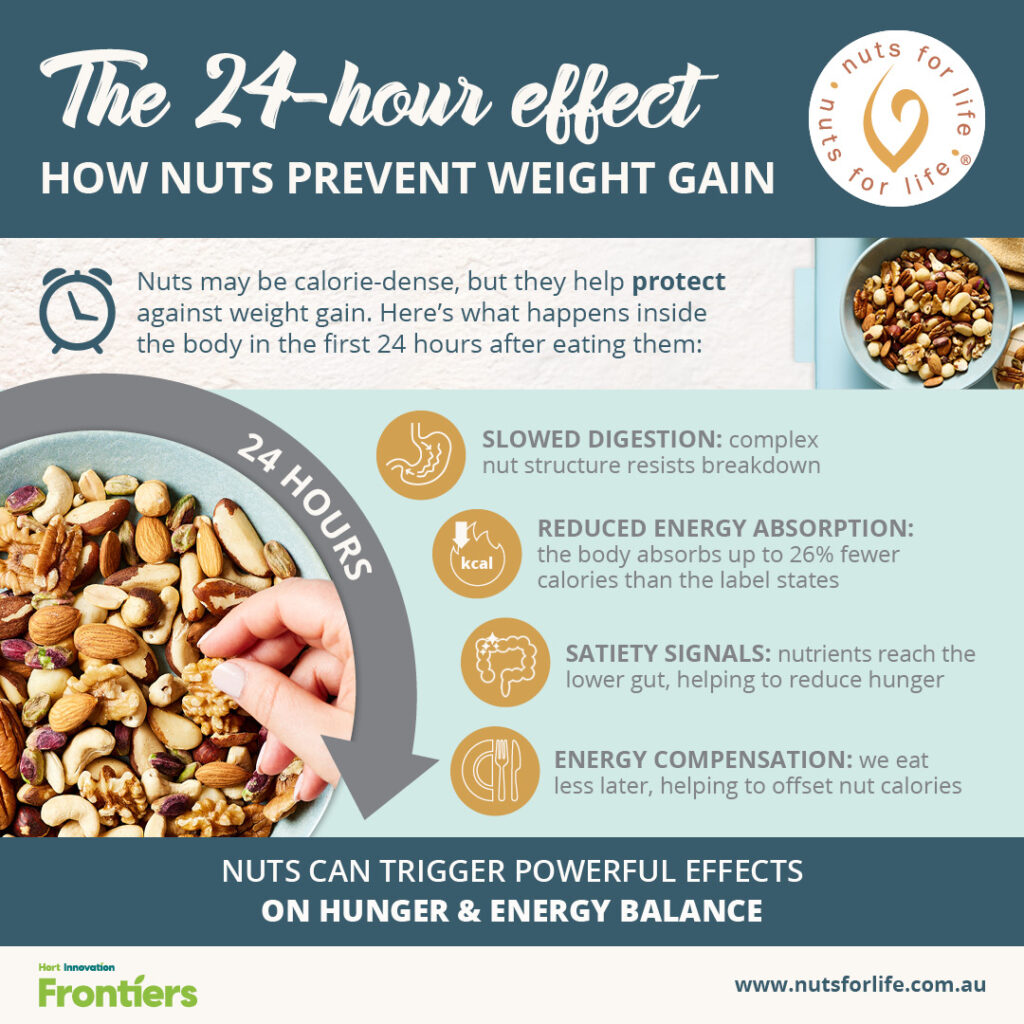
Mental health research
The body of evidence about nuts and mental health continues to grow, with new local and international research papers regularly…

Not all energy-dense foods lead to weight gain – and this is especially true for nuts.
A wealth of good-quality evidence shows that nuts do not lead to short-term weight gain, despite being energy-dense (1). And in long-term studies, nuts eaters have a lower risk of becoming overweight or obese.
There are several possible explanations for why eating nuts helps (not hinders) weight management.

Current research shows that nuts reduce feelings of hunger, leading to less calories eaten later in the day, and that the true calorie content of nuts may be up to 26% lower than what is listed on the nutrition information panel.
This helps to explain why nuts do not increase body weight in short-term studies.
Current research shows that nuts help reduce feelings of hunger, and as a result, people tend to eat fewer calories later. In other words, nuts support satiety – and this is due, in part, to the naturally-high levels of fibre, protein and unsaturated fats they contain.
In a recent systematic literature review (SLR) and meta-analysis (MA) of randomised controlled trials (RCTs) (2), the effect of nuts on hunger (14 studies) and fullness (10 studies) was assessed. Nuts supressed self-reported feelings of hunger, but had no significant effect on feelings of fullness. In the studies making up this review, nut doses varied from 20-87.5g/day.
Did you know? A study, which required participants to chew about two handfuls (55g) of almonds a prescribed number of times, found hunger was lower and levels of GLP-1 were higher after 40 chews, compared to 25 chews (3). This suggests that a longer time spent chewing nuts may help to promote greater satiety.
Current research shows that, as nuts help reduce feelings of hunger, people tend to eat fewer calories later. On average, this reduction is enough to make up for about 75% of the calories in the nuts.
In other words, nut consumers ‘compensate’ for the calories in nuts by naturally eating less later.
The effect of nuts on energy intake or compensation has been studied in two recent SLRs, with similar findings (2,4). In short, energy intake increased with nut consumption, but the total daily increase in calories was lower than the energy (calorie) content of the nuts consumed, suggesting some level of energy compensation.
Did you know? A 42g ‘dose’ of nuts has been found to lead to a greater degree of fullness and energy compensation than a 28g dose (5). This might help to explain the finding that higher doses of nuts result in lower weight gain in RCTs.
We now understand that only some of the fat, and therefore calories, in nuts is fully absorbed by the body, due to incomplete digestibility and thus reduced bioaccessibility of fat.
The fat in nuts is stored in the fibrous plant cell walls, which don’t easily break down during digestion. As a result, not all the fat in nuts is available for the body to absorb – and, instead, some of this is excreted.
A recent SLR found that the metabolisable energy of nuts (that is, the amount of energy available to the body after a food is digested) can be up to 26% lower than the calorie content listed on the nutrition information panel (6).
A 30g serve of nuts provides around ~800kJ. However, up to ~600kJ may be offset by reduced food intake later in the day, and up to ~200kJ may be lost through incomplete digestion and fat excretion, depending on the nut type and overall dietary context.
Increases in energy expenditure have been proposed as another mechanism behind how nuts help prevent weight gain, but the contribution of this appears minimal (<125 kJ increase), based on a recent meta-analysis (4).
And beyond the ’24-hour effect’, nuts may contribute to lower body weight over time through other mechanisms, such as by influencing the gut microbiota composition, improving insulin sensitivity, and reducing chronic inflammation.
Advice about weight management should move beyond counting calories alone – as not all calories are created equal, and this is especially true for nuts.
Collectively, the mechanisms of satiety, energy compensation, and metabolisable energy, help to explain how nuts prevent weight gain in short-term studies. However, further research is needed to better establish this fascinating area of science.
What is clear is that a daily nut habit can be part of a healthy diet, without fear of weight gain.
Published September 24, 2025
Be sure to follow us for great recipes,
Nut inspirations and fun facts
For up to date information & the latest research articles